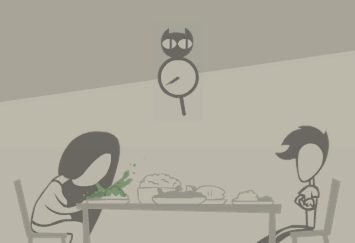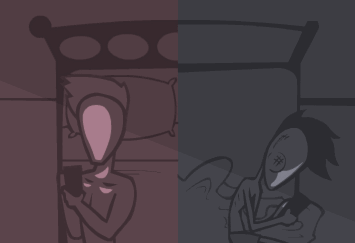Before reading, I recommend you play Coming Out Simulator yourself here. While there isn't much to spoil, it's really worth it to play the game before listening to me talk about it. It doesn't take very long to complete. I'll be here when you get back. I promise.
Growing up is hard: No matter how privileged their upbringing, every kid has struggled with relationships - with their parents, with their peers, and with themselves. I started my morning the other day by playing Nicky Case's Coming Out Simulator 2014, and felt a flood of feelings I thought were gone the day I graduated high school. While the name of the game implies it's about coming out of the closet - which it is - it also isn't just that. It's an illustration of a small fragment of time in a teenager's life. The significance of that moment may be different from person to person, and for me that significance is in relationships.
The dialogue in Coming Out reminds me of the subtle consequences in games like Telltale's The Walking Dead, and thematically feels extremely similar to Nina Freeman and Emmet Butler's Ladylike. People remember the things you say and hold you to your own word. More importantly, the people you interact with act like people and not plot points. It isn't about the evil parents and the sweet boyfriend so much as it's just about what roles they play in the main character's life.

"Mom, I'm gay." *barf* "Whaaaaaaaat"
The dinner conversation in this game reminds me of many I had in high school, even if the arguments were completely different. Sure, I wasn't gay, but I'm sure we all had to deal with a couple of nasty arguments growing up (2021 edit: Oh my god past Zoë, if only you knew). I was a teenager, I wanted different things than my parents wanted for me sometimes. Maybe it was more freedom to go out late on the weekends, maybe it was something involving my girlfriend - I really don't remember these days. What I do remember is how heated it got. How alone I felt. How I thought I was trapped because at the end of the day, I was under my parents' rules. In retrospect, neither side was really wrong, we just had different goals in mind. When my parents acted irrationally, it was proof to me that they were human too. When I fought back, maybe the only idea I was conveying was that they might be wrong (2021 edit: in retrospect, they were).
In the game, it's the same way. Your mother, misguided as she may be, is acting in what she thinks is your best interest, even if she's overstepping her boundaries by reading your texts. Your dad doesn't understand you when he says the games you make aren't truly games (like the ones he plays while slacking off at the office) - that and he punches you right in the face for talking back to him.The conversation just will not go in your favor. Even the best outcome leaves you lying to your parents while they insult you to your face. Of course, they're not hurling insults at you, but it's the little statements that hurt: The ones that make your boyfriend sound like an object and not a person. The ones that belittle the games you make lovingly. The ones that remind you you're worthless unless your grades are good.
Or maybe I'm just projecting.

This game is important. It doesn't have a crazy message or anything, it just presents a situation as it is. For the kids who grow up thinking the entire world is against them, this is exactly what they need to see. It's a reminder that no matter how bad it is, you're probably not alone. As simple as it is, that's something a lot of people need to hear. Hey, maybe if a few parents play this they'll see what an argument might look like from their child's perspective. In a sense, there's really no good ending to this conversation, but that's okay too.
A good ending doesn't really make for an honest game, does it?